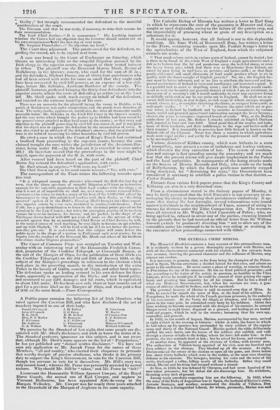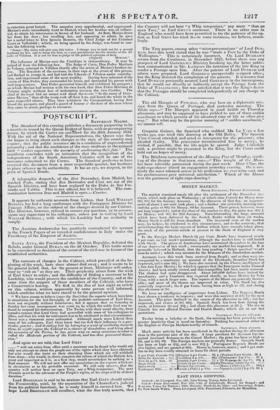THE GUERILLA CHIEF MERINO.
The Memorial Bordelais contains a long account of this extraordinary man. It is evidently written by a person thoroughly acquainted with Merino, and with all the circumstances connected with his exploits. A few extracts from. this account, showing the personal character and the influence of Merino, may interest our readers.
It is necessary to premise, that, so far from being the champion of the Priest- hood in Spain, Merino entertains a decided hatred- for that class, and admits no
priest to his confidence. He never enters a place of worship, or returns thanks
to Providence for any of his successes. He has no fixed political principles ; and has, according to the writer of the article in question no hostility to the Ultra. Liberals, whom be would join if he could be assured of their gaixiing the upper hand, and grunting hint impunity for all his crimes. But he has a dread cf. what are Moderate Governments, lest, when his services are over, a gua- rantee of oblivion should be broken, and he be sacrificed. The personal bravery of Merino is said to exceed even that of Mina. In 1808, he carried by assault the town of Roa, at the head of his soldiers. At Pampeluna, he made the whole of the French garrison prisoners, by the audacity. of his movements. At the Venta del Ahgel, at Almazan, and in many other places in the same year, he astonished every body by his boldness. About this • time, wishing to become antedated with the designs of his enemies, he entered. Burgos seven or eight times, disguised as a peasant, and leading an ass loaded with red pepper, which be sold in the streets; becoming thus his own spy, counsellor, and general. In 169.3, in tine month of August, Merino, accompanied by four men, arrived: at eight o'clock in the evening at Ontoria: whilst at table, the house in which he haul taken up his quarters was surrounded by sixty soldiers of the regular army and thirty of the National Guard : Merino quitted the table, deliberately saddled his own horse, saw the horses of his soldiers also saddled, and rode through a shower of balls to the bridge, where his horse fell under him: in this position, the two sentinels fired at him ; but he raised his horse, and escaped.
At another time, 1w appeared at the chateau of Colitis, with twenty men.
The authorities of Yillakoz being apprised of his visit, sent one hundred and forty soldiers to the chiteau. They blocked up all the avenues. At night, Merino ordered the owner of the château to open all the gates, and drove before him about thirty bullocks which were in the stables, at the same time shouting defiance to Iris enemies. The besiegers, hearing his voice and the noise of the sortie, discharged a volley, killing nearly all the bullocks. Before they could reload, Merino and his troop had escaped without a wound.
At Boa, in 18'23, he was defeated by Obregon, and had seven hundred of his men taken prisoners; but his defeat did not discourage him. He withdrew, disputing every inch of ground.
Among many anecdotes respecting him are the following. In I8, when the army of the Duke of Angouleme was in Spain, the husband of Merino's sister, Antonio Santuyo, and another, assassinated the Alcalde of Villahoz, Doa Mateo Alvarez, a distinguished Liberal, for whom, personally, Merino was said to entertain great hatred. The assassins were apprehended, and imprisoned. Merino's sister immediately went to Madrid, where her brother was all influen- tial, to obtain his intercession in favour of her husband. At first, Merino drove her from his door ; but recalling her, and appearing to relent, he gave her a sealed letter to Don Ignacio Romero, the Chief Judge of the Criminal Court at Valladolid ; which, on being opened by the Judge, was found to con- tain the following words.
Senor—My sister will give you this letter. I charge you to look out for a second husband for her, and to hang the first, as a just punishment for the murder of the Al- cable of Villahoz. It is not fur him to judge of the political opinions of men. (Signed) • MERINO."
The influence of Merino over the Castilians is extraordinary. It may be judged of from the following fact. The Judge of Coria, Don Pedro Martinez ile Velasco, returned to Villahoz shortly after the arrest of Merino's brother-in- haw. The Royalists of the environs, in their rage at the arrest of this person, had flocked to avenge it, and had laid the Liberals of Villahoz under contribu • Lion, and imprisoned some of the most wealthy. Having been informed of the return of Don Pedro, they surrounded his house, and demanded his person with loud imprecations. Don Pedro presented himself, and exhibited his passport ; vu-which Merino had written with his own hand, that Don Pedro Martinez de Velasco might without fear of molestation traverse the two Castiles. The chief of the band had no sooner read aloud the words " In the name of Gem- nimo Merino," than all the troop took off their lilts, and heard the whole in the most respectful silence. They then withdrew the Commandant, having first kissed the passport, and placed a guard of honour a, the door of the man whom they came to arrest, perhaps to massacre.















 Previous page
Previous page